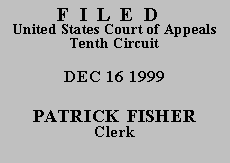

| CHARLES M. MEYERS and LINDA S. MEYERS, | |
| Plaintiffs - Appellants, | |
| v. | |
| SGT. HANS GROSS, DEPUTY GORDON CARROLL, and DEPUTY CAREY BACON, all of the Arapahoe County Sheriff's Department, | |
| Defendants - Appellees. |
Plaintiffs Charles M. Meyers and Linda S. Meyers appeal the district court's dismissal of their civil rights action.(1) Filed pursuant to 42 U.S.C. § 1983, this action arose out of a traffic stop to investigate the driver of the vehicle, Mr. Meyers, for not having a valid driver's license in his possession. Plaintiffs sued several individual police officers, complaining that the traffic stop and subsequent detention on April 8, 1996, violated their First and Fourth Amendment rights. In an order filed February 19, 1999, the district court granted summary judgment to Defendants because it concluded as a matter of law that the record would not support a finding of either illegal detention or a violation of Plaintiffs' rights to free speech. While the court alternatively relied on qualified immunity, we have no need to reach that issue.
By the very nature of their First Amendment claim and the history of this case as set out in the extensive record, it is clear that Plaintiffs had set a course intended to challenge the validity of the Colorado driver's licensing laws. In July 1995, Mr. Meyers was charged in state court with operating a motor vehicle without a license or registration. During a preliminary hearing on those charges on April 8, 1996, Mr. Meyers declared that, approximately a year and a half before, he had voluntarily revoked his license. This information, when conveyed to Defendants, was abundant evidence that Mr. Meyers had no valid license and that he therefore had none in his possession while driving as required by Colorado law. When the matter had recessed for the day, Mr. Meyers drove away from the courthouse with Ms. Meyers as a passenger. After witnessing this, Defendants stopped the vehicle because they knew, or at the very least had reasonable articulable suspicion, that Mr. Meyers was driving without a license.
While citizens are at liberty to challenge the validity of the laws, if they do so by violating them the police have the right and duty to enforce them until invalidated by repeal or duly constituted court authority. Until thus invalidated, an enforcement officer who has reason to believe the plaintiff is violating that law, whatever the plaintiff's reasons, does not violate the Fourth Amendment by detaining the person to investigate the facts reasonably believed to be true. Because of the prior history of confrontational behavior of these Plaintiffs toward police officers, which was established as a matter of fact by the state court, the conduct of Defendants during the April 8, 1996 stop was clearly reasonable. The district court correctly determined that the officers' conduct could not form the basis of either an unreasonable stop or detention, see United States v. Botero-Ospina, 71 F.3d 783, 787 (10th Cir. 1995), or a claim for violation of a First Amendment right to protest the state driver's license laws. Cf. Cotner v. Hopkins, 795 F.2d 900, 902 (10th Cir. 1986) (affirming dismissal of allegations of constitutional violations because they were conclusory and unsupported by the record).
In their reply brief, Plaintiffs raise for the first time on appeal a Fifth Amendment claim of unreasonable duration of the stop and detention. While we generally will not consider an issue on appeal that was not raised below, see Walker v. Mather (In re Walker), 959 F.2d 894, 896 (10th Cir. 1992), we reject the Fifth Amendment claim on its merits as having no support in the record, and we deny Defendants' motion to strike that portion of the brief.
For these reasons, we affirm the judgment of the district court granting summary judgment to Defendants and dismissing the case.
AFFIRMED.
Entered for the Court
Monroe G. McKay
Circuit Judge
*. This order and judgment is not binding precedent, except under the doctrines of law of the case, res judicata, and collateral estoppel. The court generally disfavors the citation of orders and judgments; nevertheless, an order and judgment may be cited under the terms and conditions of 10th Cir. R. 36.3.
1.Mr. Meyers is also known as Michael Charles Minors and Ms. Meyers is also known as Linda Sanders.